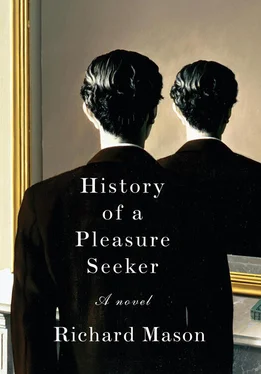But Piet had stood up and did not hear. He retreated to the dark space beneath the bridge. Didier hesitated, but a sixth sense told him not to follow. The silence lasted so long he almost thought himself mistaken until a thunder of urine confirmed that this was a call of nature and not an invitation. When Piet returned he was paler.
“Regretting the brandy?”
“Beginning to.”
Didier considered. It would be easier to initiate a play fight during the walk home, but there were also possibilities in the view and the moonlight. He decided in favor of tenderness. “You’ll be sick if you move at once. Stay here a bit.”
Piet obeyed. It was obvious from the way he sat down that he was considerably drunker than Didier, who took heart from this advantage. Nina Barol had liked to play with her son’s hair. When Didier ran his fingers through it — very calmly, with no trace of nerves — Piet did not resist. He was not troubled by physical affection. On many occasions he had spent an hour or two lying in another boy’s arms and had often profited from the willingness of certain school friends to perform relieving favors for him. Tonight his thoughts were running in a wholly different direction. As Didier stroked his curls he imagined Jacobina Vermeulen-Sickerts in a slip of rippable muslin and began to wish for morning. Finally he shook his friend’s hand from his head and stood up. “Come on. Have to sleep.”
They walked home together, not touching. Didier let them into the kitchen, and when he had locked the door he bent down and undid Piet’s laces. He pushed him against the range, lifted his feet one by one and pulled his boots off. “They’ll squeak on the tiles.” He leaned very close as he whispered. “If we wake the witch she’ll turn us to stone.”
“Mustn’t wake the witch.”
“Indeed not.”
“What I need …”
“Is some help getting to bed.”
“No. Witch’s apple cake. Must have some of the witch’s apple cake.”
Didier took his hand and led him to the stairs. “You go up before you break something. I’ll bring it in a minute.”
As Gert Blok readied himself for bed on the deserted attic floor of Herengracht 605, he knew instinctively that the young men were out together. The knowledge lurked on the edges of his consciousness: a heavy, gray mass of bitterness. It was not the first time Gert Blok had been left out. As he brushed his teeth he felt like the seven-year-old he had once been, forced by the popular boys to play in the woods alone. The intervening fifty years had not made this misery easier to bear; they had fossilized it into rage.
He went into his bedroom and closed the door, resisting a mounting, savage lust. Unexpressed, unsatisfied, sincerely repented; capable, nevertheless, of overthrowing his reason. He hesitated before taking off his dressing gown. He was sure the boys would not be back for hours. A devilish voice suggested he profit by their absence, since the opportunity might not recur for months. He stood still, paralyzed by a familiar and unequal struggle; then he lost it and went into the corridor and opened Didier’s door.
Gert Blok remembered very well his first glimpse of Didier Loubat: holding a silver-plate cake stand on the terrace of the Amstel Hotel, bending slightly toward the gentleman he was serving, his trousers hugging the curve of his spectacular arse. He had seconded him at once to the house and trained him personally. Since that day, on two occasions, he had seen his buttocks wrapped in a tightly stretched towel. Once, by creeping to his door and throwing it open the instant he knocked, he had caught him with nothing on at all. He went into his bedroom and buried his nose in Didier’s pillow. Though the linen was changed regularly, it was incontrovertibly his pillow. This was where his cheek rested; here was a fine blond hair.
Mr. Blok put the hair into his dressing gown pocket and began to touch himself. For a moment he was handsome and vigorous and carousing with the young men. The vision made him bold. He replaced Didier’s pillow and rifled his laundry bag, where the smells were stronger and less decorous. Next he went to Piet’s room, but found to his irritation that his sheets were clean and held no trace of him. His laundry bag was empty. All he had were the memories of summoning him to Maarten’s office or barging in before dinner and catching him half dressed.
He took these images back to his own bed and opened the Pandora’s box in which he kept other guilty treasures: snatched glimpses of a foot or a strong bare arm; the ripple of youthful muscle beneath a starched shirt. He started to sweat as he rubbed himself faster and to dread the end even as he neared it. It was announced by a spurt of warm slime, and at once the customary revulsion settled over him and cooled into a sarcophagus of shame. He remembered the prohibitions of Leviticus and St. Paul; he thought of them constantly and did his best to abide by them and always failed. He was accustomed to self-loathing, but tonight it mixed with the ache of abandonment and coagulated into hatred.
He lay in the dark as he had lain on many nights, listening to Piet and Didier laugh in the echoing bathroom across the hall. With a slow, deliberate cruelty he tortured himself by imagining them together — maybe with women, certainly drunk and happy. So real were these visions that when he heard a floorboard creak he thought he had imagined it. But he had not. Piet was climbing the stairs. Where was Didier? He felt in the dark for his pocket handkerchief and dried his sticky fingers. Then he switched on the light. The evening’s agonies demanded expression, and the only expression was vengeance. He felt sure that Didier was doing something for which he might punish him; with any luck, something so grave that the punishment might be permanent. He owed the lad nothing. If he could not have him he would not protect him.
When he had washed his hands and arranged himself he put on his dressing gown, parted his hair carefully, and went downstairs. He found Didier in the kitchen stealing two slices of the Vermeulen-Sickerts’ apple cake and dismissed him on the spot. “You may stay the night since it is so late,” he said with splendid froideur . “But I will not tolerate thieving. Make sure you are gone before lunch tomorrow.”
And when Didier had stumbled up the stairs, his apologies refused, Gert Blok sat down at the kitchen table, and ate both slices of cake, and felt better.
Didier went straight to Piet’s room. He was horny enough not to mind much about the future. Piet was lying on his bed, shirt and trousers on the floor, head back, mouth open. He was fast asleep. The moon’s light caught his profile and shadowed the indentations of his powerful body. He was snoring lightly and twitching as he dreamed. A longing to kiss him stole over Didier, but again he resisted it.
He sat down on the bed, suddenly tired. Piet muttered in his sleep and turned on his side, pulled his thick, hairy legs under him. The movement struck Didier as an invitation, as though Piet half sensed his presence and was making space for him. He took off his shirt and lay down beside him. He pressed his shoulder against Piet’s back. He could feel the warmth of Piet’s body and smell the cigar smoke in his hair; see the pimple on the back of his neck, the imperfection that made him perfect. And though the darkness had begun to spin he fell into a deep and easeful sleep.
The sound of the bell ringing to summon the household to church infiltrated Piet’s dreams as fiery, crashing cymbals. He did not often drink and was not at all accustomed to the inconveniences of a hangover. He was desperately thirsty and at the same time unable to move his body in search of water. He opened his eyes. Church was impossible. He closed them again, but then his door was knocked on and opened.
Читать дальше












